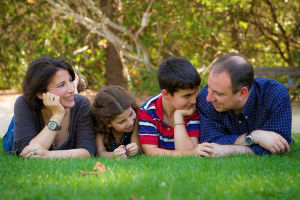What Would You Do If Your Spouse Has Cancer? (LinkedIn Influencer Cross-Post)
 Earlier this year, my never-smoking 41-year-old wife was diagnosed with Stage IV lung cancer. As you can imagine, this diagnosis turned our world upside down. Here are five key steps I took shortly after my wife’s diagnosis:
Earlier this year, my never-smoking 41-year-old wife was diagnosed with Stage IV lung cancer. As you can imagine, this diagnosis turned our world upside down. Here are five key steps I took shortly after my wife’s diagnosis:
1) Put the Kids First. Previously, my wife and I had a stereotypical division of labor: I was the revenue generator, she was the childcare provider. With my wife’s diagnosis, she could no longer provide day-to-day childcare, so I immediately took over all of the day-to-day childcare, from making lunches to picking the kids up after school. I wanted to preserve a sense of normalcy in my kids’ lives in light of the huge emotional impact they’ve felt.
A few weeks later, after feeling overwhelmed trying to manage four people’s lives, I put in place a new allowance program that codified many of the kids’ daily responsibilities (from feeding the cat to putting on sunscreen) and rewarded them for handling those tasks themselves. This has had the side benefit of helping the kids improve their independence.
2) Declutttered the Kids’ Schedules. The kids had at least one out-of-school commitment each day of the week. Each commitment made sense individually, but collectively these commitments meant the kids had little free time. I dropped a number of the kids’ commitments principally to simplify my own transportation/childcare logistics, but the change also made the kids’ daily schedule is a little less frenetic and stressful.
3) Decluttered My Schedule. I love my job, and I constantly overbooked my life with professional commitments–not because I had to, but because I enjoyed doing so. Without my wife handling childcare, many of my discretionary professional undertakings became unaffordable luxuries. In the first few days following my wife’s diagnosis, I canceled almost all of my travel, dropped off several advisory boards, reduced or eliminated some of my administrative obligations, and ramped down my blogging. I am effectively doing a mid-career reprioritization. What are the key professional deliverables I must achieve, and how will I find the time to deliver them? For me, it all starts with saying “no” more often to discretionary professional tasks, and my family’s needs provide ample motivation to say no more often.
4) Accepted the Kindness of Others. My wife chose to publicly share her diagnosis. As a result, we’ve been overwhelmed with kind offers to help us. I’ve always had difficulty accepting offers of help, so my initial reaction was to resist them. The truth is that we actually needed the help, and I’ve overcome my initial resistance and gratefully accepted some of these offers. I’ve been blown away by how our communities have rallied to assist us, even though we haven’t always been equal participants in those communities. This experience has taught me a lot about ways we can help out others in their times of need.
5) Organized Our Legal Affairs. My wife and I were both lawyers, yet we had never done any basic estate or healthcare planning. As relatively young adults in good physical health, organizing our legal affairs has always felt like something we could deal with later. Now, with the prospects of major structural changes to our lives staring us in the face, this required immediate attention.
It took a family emergency for me to take these steps, but looking back at the chaotic state of our lives, I probably needed to take many of these steps anyway. Perhaps this post will give you some impetus to review your own situation and consider if you should revamp your priorities–without waiting for a family crisis to force those choices.
Related Posts:
* Lung Cancer Isn’t Just Life-Changing. It’s Community-Changing

Dear Eric,
First of all, thank you, to Lisa and yourself, for sharing your story.
I wonder if there is an email address at which I could reach you and/or Lisa?
I currently work on a digital innovation project aiming to improve the lives and care of lung cancer survivors, and I would love to share our ideas with both of you and possibly get your input on it.
If you’re interested, please send me an email and I can tell you all about it 🙂
Wishing you all the best,
Marika